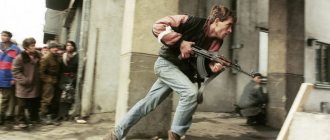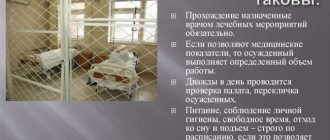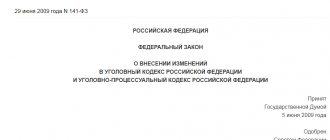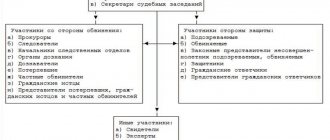A suspended sentence as a mitigating measure is applied by the judiciary in cases where the possibility of correcting a convicted person outside the place of imprisonment has been established, if the crime committed does not fall into the category of categories of offenses prohibited for replacing real imprisonment with suspended sentences.
Multi-channel free hotline Legal advice on criminal law. Every day from 9.00 to 21.00
Moscow and region: +7 (495) 662-44-36
St. Petersburg: +7 (812) 449-43-40
Article 73 (suspended sentence)
Art. 73 of the Criminal Code of the Russian Federation determines the possibility of replacing, by decision of a judicial authority, real imprisonment with a suspended sentence.
Such possibilities include the following cases:
- labor activity of a corrective nature;
- the presence of a serviceman in a military disciplinary unit;
- stay in places of detention, the term of stay in which according to the sentence is less than eight years.
If the crime committed by the convicted person belongs to one of these types, the real term for it can be replaced by a court decision with a suspended sentence.
In addition to the categories of applied punishments that allow an alternative to real terms, there are several categories of criminal offenses, after the commission of which conditional types of punishment are never applied.
These categories include the following crimes:
- Against the sexual integrity of children under fourteen years of age.
- Providing assistance in carrying out terrorist activities, its propaganda or approval.
- Participation in terrorist communities.
- Hostage taking.
- An attack against people or organizations that are internationally protected.
- Committing a crime of high or special gravity at the stage of the probationary period during a previously established suspended sentence for a crime with direct intent.
- Committing a crime with direct intent during the period of replacing part of the prison term with parole.
- Crimes that are a relapse (simple and dangerous).
Each of these categories completely excludes the possibility of using an alternative punishment to imprisonment.
When considering the option of applying an alternative correctional measure, the court determines the degree of danger of the committed act for society, the nature of the offense, the personal qualities of the convicted person, and various circumstances related to mitigating or aggravating guilt.
If the court decides to apply a conditional sentence, the offender is given a certain period of time during which the offender must prove by his actions and proper behavior that he is fully aware of his wrongful actions, has repented and corrected himself.
Art. 73 of the Criminal Code of the Russian Federation establishes the length of time for checking the correction of a convicted person.
The deadlines are determined as follows:
- if a guilty verdict passed by a court establishes imprisonment for a term of less than a year, or a more lenient punishment is established, the limits of conditional punishment are calculated from six months to three years;
- If a guilty verdict imposed by a court establishes imprisonment for a term of more than a year, the minimum term remains the same, and the maximum increases to five years.
The judicial body has no right to go beyond these boundaries, either more or less.
The beginning of the calculation of the suspended sentence is the day the guilty verdict enters into force. This period also includes the period of time from the date of proclamation of the court decision at the hearing.
If criminal liability for an offense has been imposed in the form of keeping the offender-military in a military disciplinary unit, the probationary period is limited to the period remaining until the end of service at the time the conviction is announced.
Replacing actual imprisonment for a certain period with a suspended sentence does not prohibit the court from imposing additional corrective measures on the convicted person.
When assigning a conditional sentence, the court, based on the ability to work, age, health, establishes a number of restrictions on the activities of the convicted person.
These include the following restrictions:
- Prohibition on changing the place of permanent residence without notifying the supervisory authority.
- Prohibition on changing the place of study or employment without notifying the relevant control authority.
- A ban on visiting a certain range of events and places.
- Obligation to complete a course of getting rid of alcohol, toxicological or other types of addictions, treatment of sexually transmitted diseases (if necessary).
- The obligation to officially find a job, be reinstated at the place of study, and the like.
In addition to these duties, the court may impose other sanction measures that should contribute to the correction of the convicted person.
The implementation of the imposed sanctions measures is controlled by special state-level bodies. If punishment is imposed on a military serviceman, control is carried out by the command of the institution or military unit to which the convicted person belongs.
The control and supervisory authority has the right to submit to the court a proposal to change the scope of duties of a conditionally convicted person in the direction of reducing or increasing the number of duties.
FAQ
What is a criminal amnesty?
Amnesty (Article 84 of the Criminal Code) is an act of the legislative body of the country in relation to an individually unspecified circle of persons who have committed a crime, in accordance with which the persons specified in it are exempted from criminal liability or from punishment, the punishment assigned to them is mitigated or replaced by a more lenient one, and persons who have served their sentences have their criminal records expunged early.
The amnesty is declared by the State Duma of the Federal Assembly of the Russian Federation in relation to an individually unspecified circle of persons (clause “o” of Article 71, clause “e” of Part 1 of Article 103 of the Constitution of the Russian Federation, Part 1 of Article 84 of the Criminal Code).
By its legal nature, amnesty is a complex legal institution: it is both a constitutional legal act (resolution of the State Duma) and an important event of a criminal legal (and also, to a certain extent, criminal procedural and criminal executive) nature. .
Commentary to Art. 73 of the Criminal Code of the Russian Federation
The latest version of the criminal law clearly defines what a suspended sentence is.
In addition, the legislator has determined that only its main types can be replaced with a conditional form of punishment. If the court is considering the possibility of correcting a person who has committed several crimes without serving a real sentence, it has the right to establish a suspended sentence based on the sum of the terms for all the offenses considered in court in the aggregate.
The following types of criminal sanctions cannot be replaced by a suspended sentence:
- fine;
- compulsory work activity;
- deprivation of the opportunity to carry out a certain type of activity;
- deprivation of the opportunity to occupy certain positions.
When the court makes a decision to replace the term with a suspended sentence, it is necessary to indicate the justified reasons for the decision.
The regulatory framework of court decisions allows us to establish that decisions on choosing an alternative measure of responsibility are made by judges for all categories of criminal offenses. This takes into account the fairness of the relationship between the action committed and the punishment imposed and the real chances of complete correction of the person in order to prevent him from committing new crimes.
If a person on probation violates the rules of conduct established by the court, the supervisory and control body has the right to submit to the court a proposal to increase the probation period or to include additional duties of the convicted person. The court may increase or decrease the terms and add or remove some duties. The court does not have the right to supplement the authority’s requirements with its own options.
Correctional and compulsory labor for a crime
Correctional labor is a traditional measure in Russian legislation, which acquired official status in 1917.
Their main difference from compulsory work is that persons involved in their performance have 5–20% of their wages withheld in favor of the state.
The basis for such a measure are crimes of minor and medium gravity.
Correctional work as a type of criminal punishment is more of a preventive nature. They are considered one of the “softest” UL and can be installed for a period of 2 months to 2 years.
In case of evasion, it is possible to replace it with forced labor or imprisonment.
Compulsory work was included in the domestic Criminal Code of the Russian Federation in 1960.
Their peculiarity lies in their replaceability and the possibility of substitution.
- The first - in case of evasion, provides for detention for a period corresponding to the unworked time, or replacement with forced labor.
- The second is the possibility of replacing a fine with this measure.
Compulsory work as a type of criminal punishment applies to employed and unemployed persons and involves the implementation of work activities during free time from main work/study.
You can learn more about the procedure for recognizing a person’s incapacity.
Their fundamental difference from correctional institutions is that they are free. Duration 60–480 hours.
This type is more psychological in nature, since it reveals obvious punitive elements: lack of payment, the need to perform work without fail in an established territory, social censure, etc.
The basis for correctional labor are crimes of minor gravity, the punishment for which is no more than 2 years.
Judicial practice under Article 73 of the Criminal Code of the Russian Federation
An example of a court decision on the issue of serving a suspended sentence is the court hearing in 2022 case No. 4/15-17.
According to the court decision, citizen Polyakov was sentenced to three and a half years for possession of firearms and drugs. The judge came to the conclusion that real correction of the offender is possible without imprisonment, so the defendant’s real sentence was replaced with a suspended sentence of three years. A year later after the sentencing, the control and supervisory authority found that the convict had violated the rules of conduct while on probation, having found him drunk.
After establishing this fact, the authority sent the following submission to the court:
- On extending the term of a suspended sentence.
- About being tested by a narcologist.
- About undergoing treatment in the presence of confirmatory drug tests.
All these proposals were indicated in the submission, despite the statement of the convict that this fact was isolated, and he had no other violations of the conditional regime.
Based on the submission of the control body, the court scheduled a hearing. After hearing the parties and examining the documents presented by the correctional authority, the court found that this violation of the regime allows not only to increase the term of the suspended sentence, but also to register the convicted person with a narcologist and undergo mandatory treatment if the use of narcotic substances is detected.
Thus, the defendant, for being drunk, was sentenced to mandatory registration with a narcologist and an extension of the probation period for two months.
Types of imprisonment
Deprivation of free life for committing a criminal offense can be carried out as follows:
- arrest;
- isolation for a specific period;
- life imprisonment.
See here about such a preventive measure as house arrest.
The essence of all three is to isolate the offender, restrict movement and choose a place of residence, however, they differ from each other according to the following characteristics:
- Departure mode. The conditions of arrest are strict isolation from society in specialized places. Conditions of imprisonment for a specific period - detention in a colony, prison or medical correctional institution. A life sentence is served in a colony/prison.
- Deadlines. Arrest is expected for 1-6 months, imprisonment with a specific term - for 2 months-35 years. Life imprisonment - for life, if not.
What restrictions exist?
There are certain restrictions with this punishment.
They do not relate to education - a citizen can still receive education, but only within his city.
He has the right to work. However, there are several nuances: he cannot hold a position in government agencies or law enforcement agencies. What has already been said above.
It happens that a convicted person is prohibited from leaving the house or apartment in which he lives for a certain time. Citizens also cannot visit some entertainment and public places.
They are clarified in court during the announcement of the verdict. The convicted person must not use psychotropic substances or drugs.
Alcohol is allowed only in strictly limited quantities, and sometimes it is completely prohibited.
Is it possible to travel abroad?
The convicted person cannot travel abroad until the term prescribed by the court has passed.
If law enforcement agencies detect attempts by convicts to leave the country, this will be seriously punished. A citizen risks going to prison, since it is impossible to ignore the rules imposed by the court under any circumstances.
Procedure for serving the sentence
After determining the extent of the legal violation and issuing a court verdict, the convicted person is sent to the place where he will serve the period in isolation.
Then, individuals undergo a mandatory qualification and medical commission.
The second determines the degree of suitability for physical work, and the first determines the expected qualifications of the employee.
In the place of isolation, the convict is under guard, which is present 24 hours a day. The prisoner's daily routine is strictly regulated.
A mandatory condition for detention in a place where freedom of life is taken away is to be recruited to work. Labor is organized in industrial zones specially equipped for it, where security and isolation requirements are met.
In the labor zone, in addition to the convicts themselves, there are technical personnel who are busy building the work process, and civilian workers.
Criminals in places of detention may experience psychological impact for their actions from staff and law-abiding citizens who judge them.
Staying in custody is also characterized by restrictions on the choice of clothing, food and living conditions.
Classification
According to the criminal code of our country, only basic punishments are suspended. Part 1 of Article 73 provides a complete list of forms of punishment that can be suspended. This list is given above.
Let us dwell in more detail on the punishment of suspended imprisonment, that is, with a probationary period, and consider how and in which cases it is assigned.
If the court considers that a person who has violated the law can reform without actual deprivation of liberty, and the term assigned by the court is less than eight years, then the court may make such a punishment suspended.
Important! If a citizen has committed more than one offense, then the punishment is imposed not separately for each episode, but together. And the court will decide the possibility of assigning a conditional imprisonment instead of a real one in such a situation based on the totality of all the crimes committed. . There are no conditional ones:
There are no conditional ones:
- fine;
- deprivation of the right to hold any position;
- deprivation of the right to engage in any activity;
- arrest;
- compulsory work (for more information about when it is possible to replace compulsory/forced/correctional labor with imprisonment, read here).
The type of correctional institution is not specified in the suspended sentence of imprisonment.
When the court chooses a conditional sentence, a probationary period is established. This is the period during which the convicted person must demonstrate his correction and re-education. The length of the probationary period may vary. If a prison term of up to 12 months is imposed, the probationary period will be at least six months. If the period prescribed by the court is more than 12 months, then the probationary period will be assigned in the range from six months to 5 years.
What does the court consider when making a sentence?
According to Part 2 of Article 73 of the Criminal Code of the Russian Federation, when the court imposes a suspended sentence, it takes into account the nature and degree of public danger of the crime, the identity of the perpetrator, as well as mitigating and aggravating circumstances.
Public danger is a material sign of an offense. In other words, it is a threat to society, as well as the extent to which the crime committed had a harmful effect on others.
If a crime does not cause great harm to anyone or anything, it does not pose a public danger and is called minor.
Mitigating and aggravating circumstances are circumstances of a crime that can weaken or enhance punishment and affect the assessment of the act.
Mitigating circumstances are described in Part 1 of Article 61 of the Criminal Code of the Russian Federation. The list includes:
- presence of pregnancy;
- minor children of the offender;
- committing a crime for the first time;
- the age of the offender is under 18 years;
- committing a crime due to force majeure;
- if the offender provided assistance to the victim immediately after the crime was committed;
- sincere confession;
- coercion to illegal actions;
- provoking actions of the victim;
- if the attack exceeded the limits of self-defense.
Article 63 of the Criminal Code of the Russian Federation describes aggravating circumstances. These include:
- serious consequences of the offense;
- relapses;
- commission of an offense by a group by prior conspiracy;
- racial, political motives for the crime;
- sadim, cruelty;
- committing a crime against a defenseless person - for example, a child, a pregnant woman;
- involvement of citizens suffering from mental illness in crime;
- if the motive of the crime is revenge;
- use of weapons;
- committing a crime in an emergency situation, natural disaster, or during military operations;
- use of official clothing, documents, uniforms;
- breach of trust;
- if the criminal is an employee of the Ministry of Internal Affairs.
Example No. 1: A girl, while attending a concert of a famous singer, sneaked backstage and stole an item of the performer’s wardrobe—a neckerchief—as a “memento.” This crime has no public danger. In addition, according to Russian legislation, if the value of the stolen property does not exceed one minimum wage, then an administrative penalty is imposed.
A mitigating circumstance was that the citizen committed such an act for the first time. In addition, she repented, admitted guilt, and was also positively characterized by her employer. This act did not result in any harmful consequences. No aggravating circumstances were found and the case was dismissed on the grounds of insignificance.
Example No. 2: A father raising three sons kept them under a tight rein. He controlled every step, used physical violence against them, locked their houses, and did not allow them to attend educational institutions. Two sons reached adulthood, but continued to live with their father. One day, having previously planned the crime and their roles in it, they killed their father.
The aggravating circumstances here are that the crime was committed by three people, having previously agreed on how and when they would do it; their state of intoxication at the time of the crime; the particular cruelty of the crime - during the murder, more than 50 stab wounds were inflicted, then the corpse was dismembered. A mitigating circumstance will be the minor age of the youngest son.
Example No. 3: Having been released from prison, a man did not look for official work. In order to get money, he went to a holiday village. There he began to look for houses whose owners were absent, found products made of non-ferrous metal and stole them. In this way he committed several thefts.
In the last country house, he did not notice the presence of the owner and his young daughter. Having entered the house, he frightened the child with his appearance, who began to scream and call for help. The father came running and detained the criminal and called the police.
Aggravating circumstances in this case will be the fact that this is a relapse. Also, the frightened child stopped talking due to stress and required long-term treatment from specialists. This will also be an aggravating factor when choosing a punishment by the court.
A suspended sentence applied to different categories of citizens entails different consequences.
Some perceive conditional punishment as an act of mercy, of trust that must be justified. Others perceive it as a clever trick or a lucky coincidence of circumstances, thanks to which they managed to avoid responsibility.
How is the probationary period calculated?
The probationary period, according to Part 3 of Article 73 of the Criminal Code, begins on the date the sentence enters into legal force. The probationary period includes the time that has passed since the announcement of the verdict.
When a judge decides on probation, the onus is on the offender to demonstrate improvement in his or her behavior. This obligation is imposed regardless of whether the verdict is appealed in appeal or cassation.
If the sentence was left as is, this confirms its strength. The period specified in the sentence remains unchanged.
If the punishment is imposed in the form of conditional detention in a disciplinary military unit, then the probationary period is determined within the boundaries of the remaining period of military service at the time the sentence is announced.
When the verdict is announced, the judge explains in detail to the guilty person what probation means, what will happen if he regularly breaks the law, and explains the consequences that will occur if he commits a crime again. Responsibilities, if assigned, are also explained in detail. All this must also be recorded in the minutes of the court hearing.
There is a lot of other information about correctional institutions on our website:
- How do those living in prison live?
- First mover.
- The most terrible prisons in the Russian Federation.
- Pre-trial detention center.
- Prisons of the Russian Federation.
- 5 current ways to transfer money to a prisoner in a colony.
- Resocialization of persons released from prison.
- Is a certificate of release from prison a document and identification document?
- What does it mean to “sit on the lip”?
- Life imprisonment.
What is the penalty for a new crime?
If a person commits a new crime while on probation, the situation becomes much more complicated.
A citizen may be given a suspended sentence and sentenced to imprisonment for a certain period, arrest, or a fine.
It is impossible to name exact measures; it all depends on the act committed and its severity.
There is no need to think that with a suspended sentence, a new crime will not be noticed. On the contrary, it will have a negative impact on the offender. In most cases, such criminals face imprisonment.
A suspended sentence is often imposed if the crime does not pose a danger to society.
If the crime is not serious, the sentence is commuted and the citizen avoids imprisonment.
However, even in this case, it faces certain limitations and consequences. He must comply with certain requirements, if ignored, the violator may end up in prison or under arrest.
What is probation? How to understand? Find out about it in the video:
https://youtube.com/watch?v=aujM4yx6t3A%3Fecver%3D1
Didn't find the answer to your question? Find out how to solve exactly your problem - call right now:
| Share with friends: |
Did you like the article? Follow site updates or.
Comments:
Frequently asked questions about criminal penalties
What is the difference between restriction and imprisonment?
Restriction and imprisonment are independent types of criminal punishment. These concepts speak for themselves: deprivation of liberty is complete isolation from society, restriction of freedom is not isolation, but freedom, but with certain restrictions.
Deprivation of liberty takes place in colonies, prisons, or correctional medical institutions.
Restriction of freedom is served in one’s native land, without isolation from society, but with prohibitions, for example, not to leave one’s place of residence at a specific time of day, not to visit certain places, public events, etc. To monitor the serving of such a sentence, convicts are required to report monthly to a specialized supervisory body, and they are also given an electronic special bracelet that tracks their movement.
In Russia, such punishment as restriction of freedom has been in effect only since 2010. Imprisonment is known back in Ancient Rus'.
Imprisonment is prescribed for more dangerous and serious crimes, therefore the maximum term is 20 years, 30 for the totality of sentences. There is also life imprisonment, but this is a separate type.
Restriction of freedom, on the contrary, is considered a milder punishment, therefore the maximum term is from 2 to 4 years, depending on whether it is assigned as the main or additional type of punishment. And imprisonment is always the main one.






